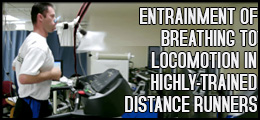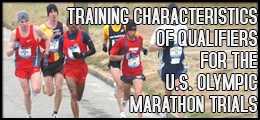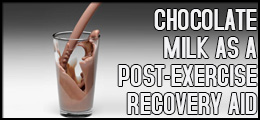It was not long after participating in my first track meet in junior high that I became interested in the science of exercise and athletic performance. Research helps us to understand how our bodies function and why they function the way they do. Some of my research interests include:
A few of my highlighted research studies… |
|

|
Research has shown that animals that run on four legs tightly couple their breathing rhythm to the rhythm of their limb movement, but that this coordination of rhythms is not as strong in humans. My doctoral dissertation examined the coordination (referred to as entrainment) of the breathing rhythm to stride rate in highly-trained distance runners while running at different speeds. This research was presented at the American College of Sports Medicine conference in May, 2009. To download the dissertation abstract, click here. |

|
How do the best marathon runners in the U.S. train? This research attempted to answer that question by taking an in-depth look at the training characteristics of the 2004 U.S. Olympic Marathon Trials qualifiers, with comparisons between men and women and elite and national-class athletes. This research was presented at the American College of Sports Medicine conference in June, 2005 and the American Society of Exercise Physiologists conference in March, 2006. To download the full scientific article, published in International Journal of Sports Physiology and Performance, click here. |

|
Chocolate milk has many great ingredients, including the two most important ones for optimal recovery from exhausting exercise: carbohydrates and protein. So it’s no surprise that it makes the perfect post-workout recovery drink. This research compared the ingestion of chocolate milk to a fluid-replacement drink (Gatorade) and a carbohydrate-replacement drink (Endurox) on endurance cycling performance, and was presented at the American College of Sports Medicine conference in June, 2004. To download the full scientific article, published in International Journal of Sport Nutrition and Exercise Metabolism, click here. |
